And just like that, it’s 2025. I’ve been off-grid for over a week now on retreat in the middle of the New Zealand native bush near Mt Taranaki. The place I stayed at was at the bottom of a property owned by two incredible people who used this land to turn it into an animal farm sanctuary for rescued animals so they could have a peaceful life where they could pass from old age instead of the slaughterhouses. They converted an old tram car (where I stayed) on the edge of the forest and made it into a little off-grid house with a classy composting toilet, a shower with a window that looked out onto lush native trees and a plethora of native birds who regularly swept through to say hi. Oh and no 12 volt power. Goodbye laptop. Perfect.
The owners (who turned out to be some of the kindest and most warm hearted people I’ve met) had worked in butchering industries at one point then had profound conversion experiences leading them to stop using animals for human consumption and follow their desire to create a place where they could give them a beautiful life. Vegan activism is a radical move here in NZ - a country that relies so heavily on agriculture and dairy production with so much of the land having been converted from native forests into farmland.
Cows that would usually get about 5 years of life have been rescued to live here and are now into their 15th year of life, silently grazing the fields and interacting with the various other rescue animals including 4 pigs, 4 goats, 2 alpaca’s and 53 roosters (who each have been given names of various rockstars..Jeff Beck, Kurt Cobain…) They respond to their names immediately and have developed deep trust with the owners, allowing themselves to be picked up with no fuss whatsoever. They even warmed to me quickly. This is Simon.
Since changing some of my own food choices (stopping eating red meat) after learning about the impact of methane gas on carbon emissions, the wisdom of animals has felt more and more available and profound to me. For a while now, I’ve been finding myself in a kind of spiritual conversation with the cows I see. Our eyes lock and I sense the trauma they’ve endured and yet, the love they still emanate and their generosity to be present, gentle and trusting toward me if I send out a safe signal toward them.
There was one animal on the farm, Daphne (a friendly 4 year old pig), that I had the deepest connection with. The wire gate outside my converted tram was the only thing between me and all the farm animals. I would eat my lunch out on the grass, watching the animals and then Daphne would wander on up making her little grunting sounds and then pause, looking at me as though she was asking for a little scratch. I went behind her ears and watched her completely surrender to my touch and just drop down on to her side up against the gate, falling asleep with me continuing to stroke her head and ears. It was such a trusting, sacred exchange and I watched her eyelashes flutter as she roused in and out of little dreams. Her tongue would sometimes pop out, a tongue that looked just like mine. A belly that swelled and deflated, just like mine. A gentle being seeking companionship and a safe place to lay down and receive kind touch from another being. It makes me get a little weepy just thinking about it now. I felt so connected. And yet, I’ve lived so much of my life, completely unaware of this kind of connection I could feel with a pig. It felt no different to the way I stroke my dog to bed at night. For a moment I could forget the usual fate of this creature and appreciate her as a sleepy mammal just like me.
It is these kinds of exchanges that so few of us actually get to have with animals - and it’s what makes it so hard to marry our deeper values around climate change, farming industries and the sanctity of life itself with our everyday consumerist values. Many of us don’t get that kind of time with them, in their natural habitat, to just get to know them and allow for them to speak to us in the language they know best — utter and absolute attention to the present moment.
The cow in Hindu society is identified as a caretaker and a maternal figure. They are seen as a symbol of unselfish giving, selfless sacrifice, gentleness and tolerance.
This is exactly what I see in the cows. It has become impossible for me to turn away from their soft gaze when I see it now. They tend to hold eye contact for so long too. There’s a whole exchange that takes place if we’re willing to be open to it, but it seems to happen on some other level or faculty of perception. A kind of speaking with the soul perhaps.
The roosters, too, have an entire language that goes on constantly through the day. The head rooster will kick off and like a Meredith Monk hocket performance, every other rooster will follow creating a surround sound echoing effect that takes off across the land. There’s little respite from this and my first thought upon arriving at the farm was, “are they EVER going to stop?” but the end of my stay I’d become quite used to it, and even though the screeching of a rooster can be a little grating at first, once I surrendered to these creatures being the only neighbours I had (it was remote out there, let me tell you) I realized it was quite nice to hear them chatting throughout the day. It made me realize that there are so many languages in the world I don’t know. Not just human ones. The language of every single living being. From the whale to the mosquito.
What are the roosters saying? Are they doing a roll call making sure everyones there? Announcing tasks for the day and confirming everyone is clear on them? I doubt there are very many tasks… they appear to have simple goals: eat, play, enjoy the companionship of their friends, watch the world around them, rest and peck at other roosters when they feel threatened. I can relate.
I sense I am not far off a completely meat-free lifestyle, it’s happening slowly and the power of a first hand experience with these animals is what draws you into the undeniable sentience, intelligence, empathy, curiosity, grounded-ness and wisdom of these creatures. It becomes harder and harder to deny their spiritual essence and reduce them to a product in the supermarket. It might not be a change we can all make overnight, but thankfully we live in a world where being plant-based can be both creative, delicious and an act of protest in a world driven by commodifying anything it can.
Each of them have something so profound to teach us — but we can only tune into their pace of life if we slow down. It would happen while I was sitting next to them some days, sometimes for an hour, just watching, expecting nothing, making myself another animal in the paddock, sharing space and land with them as they went about their day. They would look at me and I would look at them and some language would be spoken that I can’t describe or express. There was a lot of grief in the cow called Cinderella. The owner of the farm sanctuary told me that mothers cows cry for days when their calves are taken from them. Cinderella (now 15 years old) still had that trauma in her eyes. I could sense her story. We all experience loss and the will to live and not to die. The desire to be free from suffering and have peace.
It’s not easy for all of us to experience a “Road to Damascus” type conversion and suddenly upturn our entire eating habits as a result. But I do believe that starting from a place of openness, reverence for Nature and the beings that walk within it is a place that can open for us new awareness and opportunity for convictions to emerge within us, whatever they may be — perhaps only eating meat once a week instead of multiple nights, maybe choosing not to give money to the industries we know perpetuate these violent practises when we shop and only eat meat rarely when at a restaurant or maybe eliminating meat completely knowing it comes to us through means of violence, fear and trauma for the animal. Maybe we decide that meat feels necessary for us at certain times but we look for ways to eat it more ethically, less regularly and refrain from just doing it automatically because it’s what we know — forgetting the life that is sacrificed in creating that brief moment of gratification.
Seeing the world beyond the surface of what ‘we’ve always known’ feels more pertinent than ever — nobody invested in the capitalist, consumerist culture wants us to awaken to this stuff. It would disrupt everything. It is an act of protest to chose not to just go along with everything we’ve been taught about food.
Cow = steak. Pig = sliced ham in a sandwich.
We’ve forgotten the process it takes to get there and even just a little more awareness of that process can go a long way. It can trickle down into the way we treat every living being. Instead of swatting the fly, we could ask it politely to leave while shooing it softly with our hard. We could accept that there’s no real reason why it shouldn’t be allowed to land on our arm or go flying around in the air that I guess it has just as much right to as we do. It’s not easy (and I recognize this might sound completely cuckoo to some) but it’s a small way we can be mindful of the fact we have to share this land with other beings and that they all have something to teach us if we can move away from simply categorizing them as Products, Pests or Pets.
This is the place my mind has wandered to while spending time with the animals. I’ve been so blessed by their companionship, irreverence, their quirks (sit and watch alpacas for a day! they’re hilarious), their love for one another and love even for myself. An unconditional kind of love. Though we have done so much to hurt them over the centuries, they still attempt to reform trust with us over and over. It’s been important to feel the grief of all this. To know I am not responsible for all of it of course, but it has felt important to also admit that I have been complicit in an industry that has treated these beings horribly and forgotten their deep innate worth.
Even if these imprints of conviction can only move us to small actions in stages, I think we owe it to ourselves to honour when a shift takes place that is rooted in a kind of spiritual awakening, not born of shame or fear, but out of love. It’s a love that extends beyond my immediate orbit of friends and family and strangers but also to the animals… the downcast, the meek, the most vulnerable… the ones Christ had compassion for when everyone else cast them out. This is the “liberation for all beings” that Buddha speaks too. There’s no one excluded from the path to enlightenment. We are not separate. The practise of compassion, it seems, demands that we look into where it plays out in every area of our lives. Taking time to consider our relationship with animals feels like a way we can challenge the ongoing paradigm of Domination. Under this lens of interdependence, that underlying message of "power over” becomes “power with.”
The world should break our hearts, and as it begins to, my hope is that we have the courage to rebuild it in ways that promote a little more unity and healing, not further division and violence.
Coming back to the city of Auckland after being out on the farm sanctuary has been an adjustment. Every time I see the words “BLT” in a lunch cafeteria, all I think about is Daphne. The way she slumbered next to me that afternoon, softened by my hand on her head, drinking in the bliss of total safety she felt with me. I want to do better for her. I don’t want to just forget.
Maybe you’ve been thinking about some of this stuff too. I’d love to hear about your experiences with animals (obviously many of us have deep relationships with cats and dogs, but what about farm animals or insects? I’ve been paying a lot of attention to spiders recently - the ultimate creators of impermanent art!!)
I’ll finish with a quote I love which summarizes how I feel when I’m left alone with nature and animals. The primal state of being before identifications and separations find their way in.
“Perhaps there is no gift more precious than the gift of spontaneity, the ability of certain men, women and animals to act straight and fresh and self-forgettingly out of the living center of who they are without the paralyzing intervention of self-awareness.”
-Frederich Buechner
Love






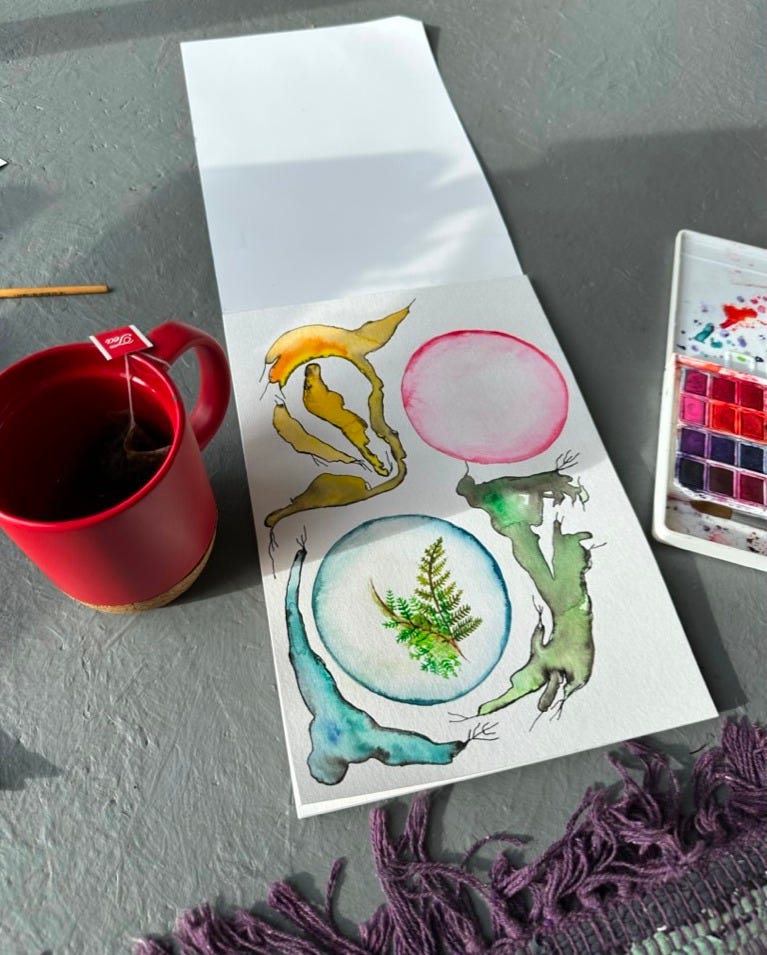
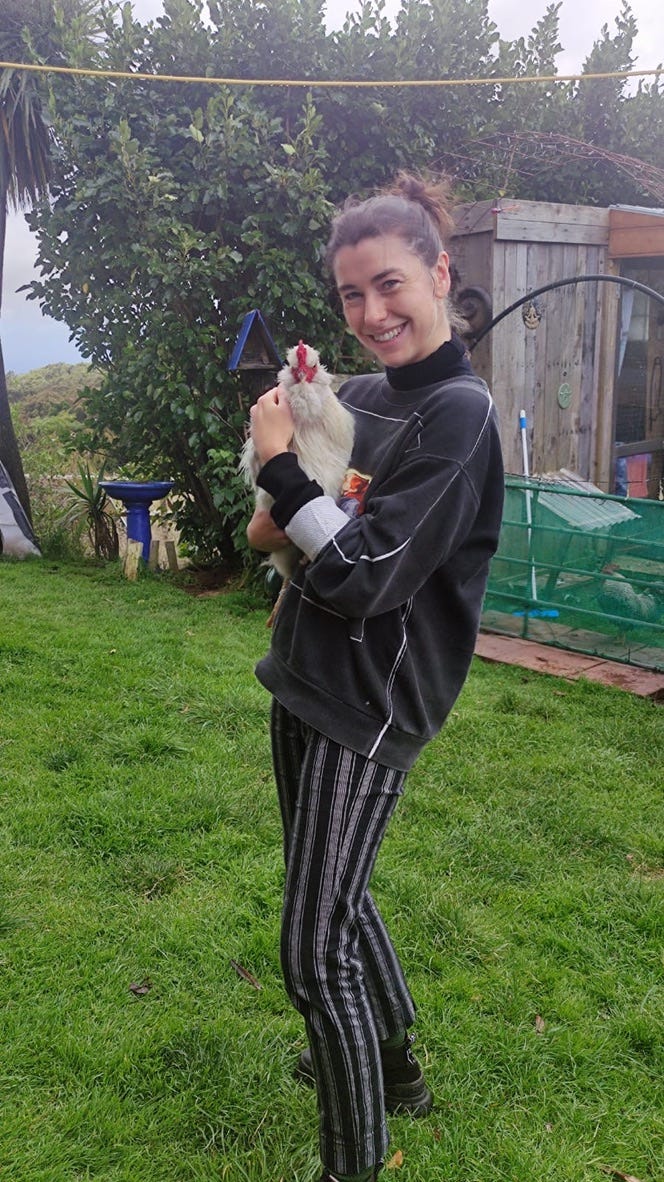
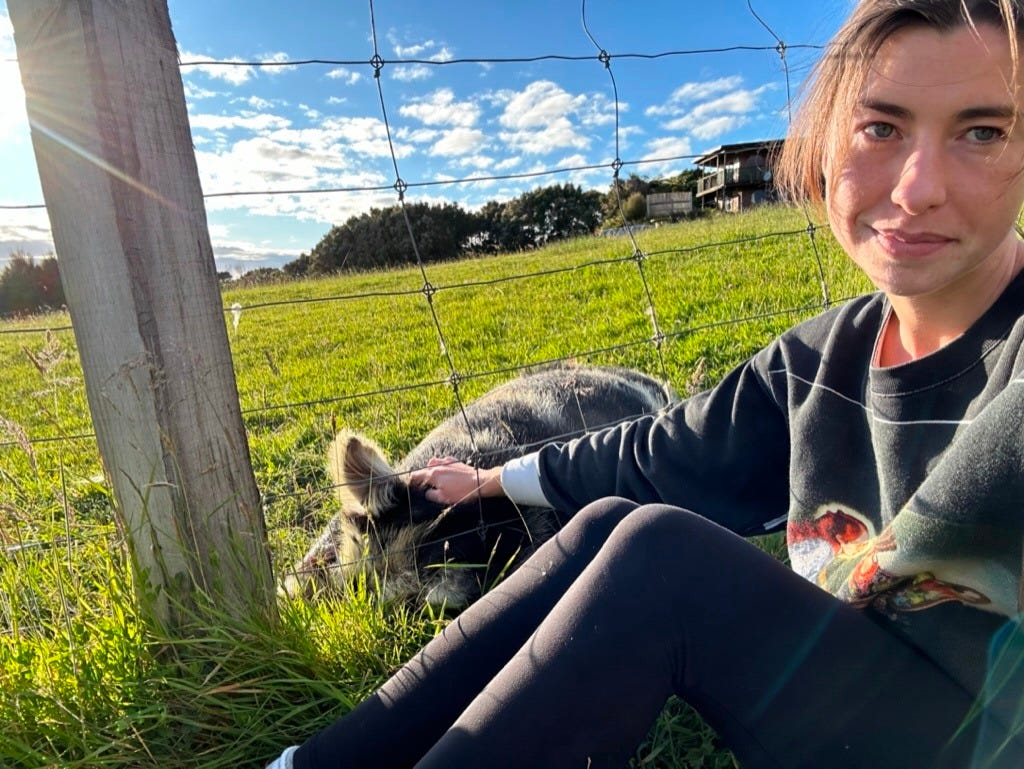
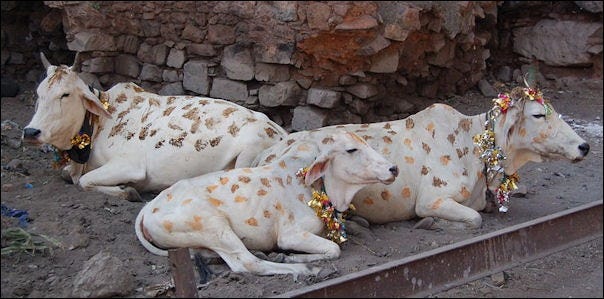
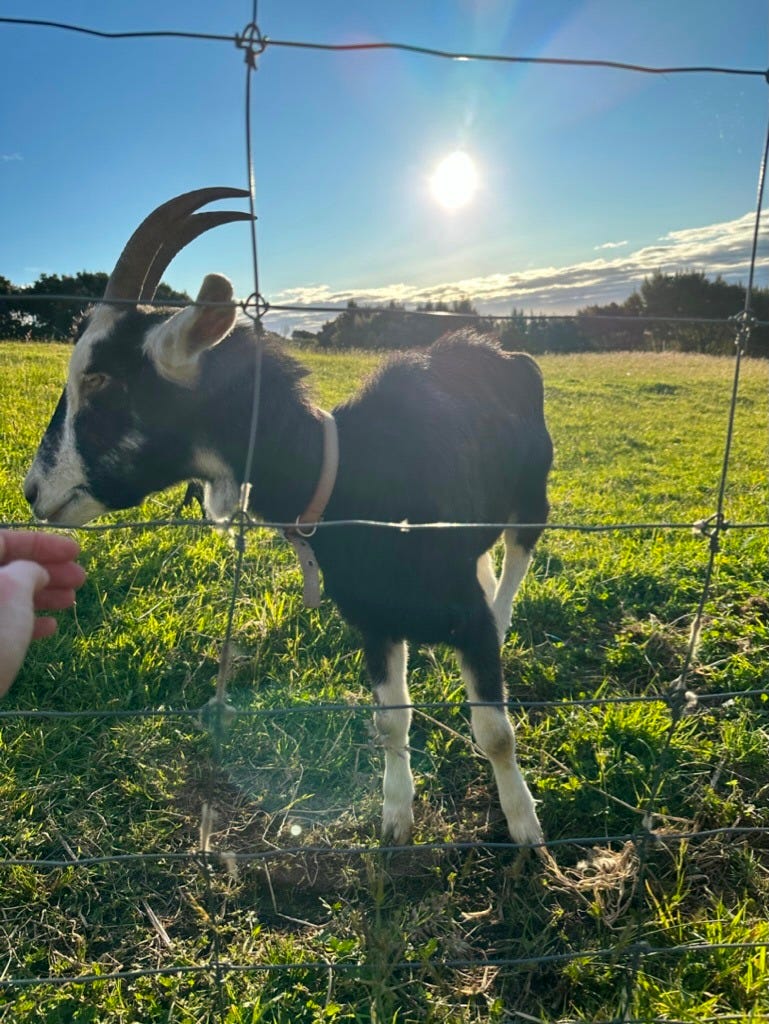
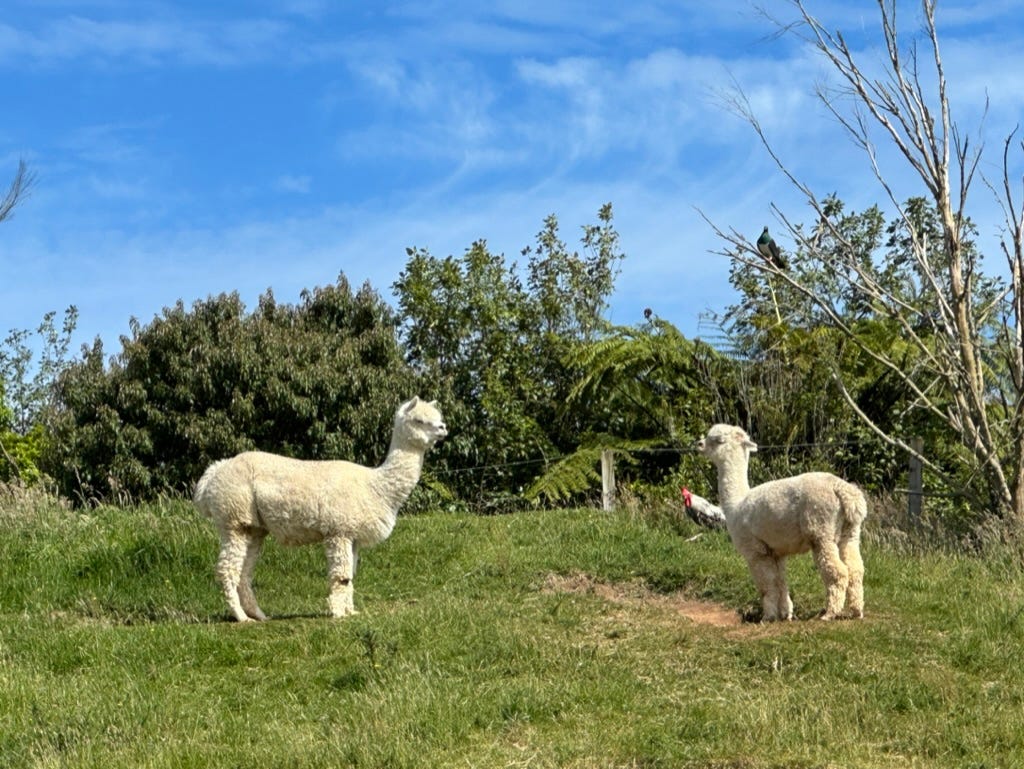
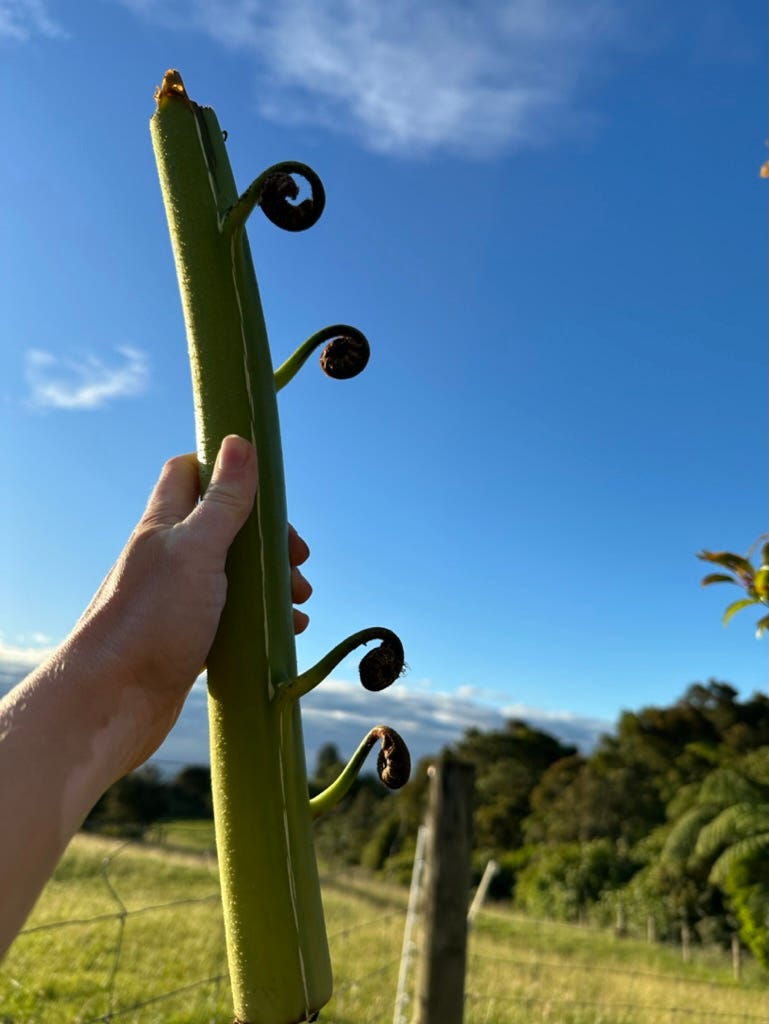
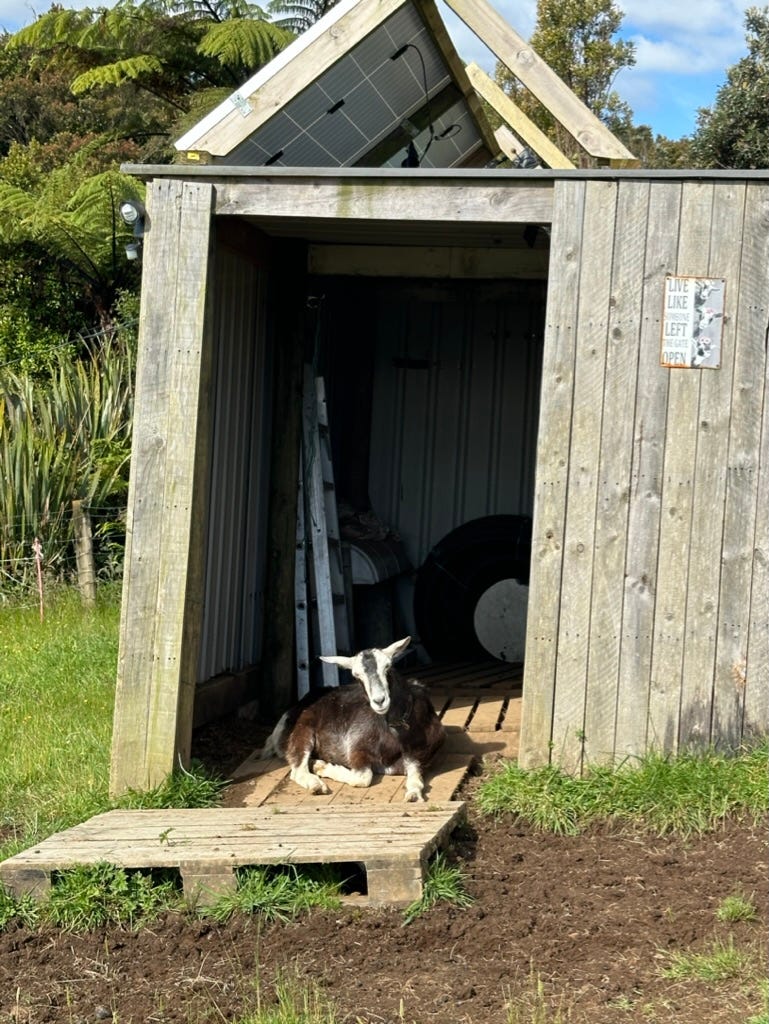
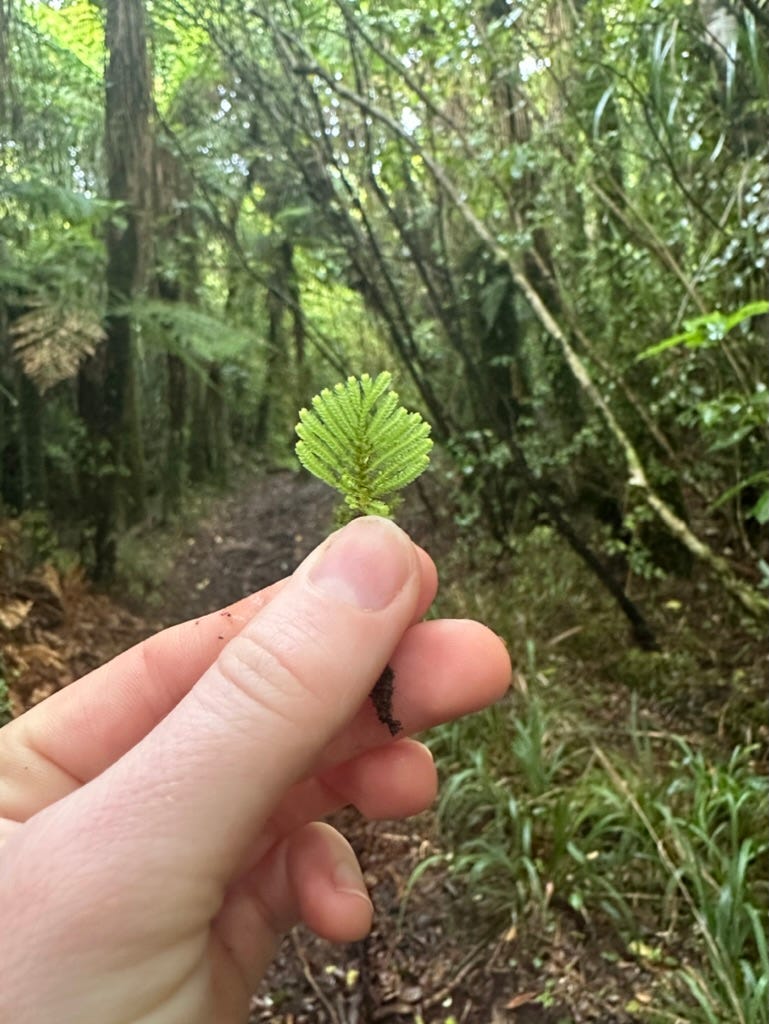
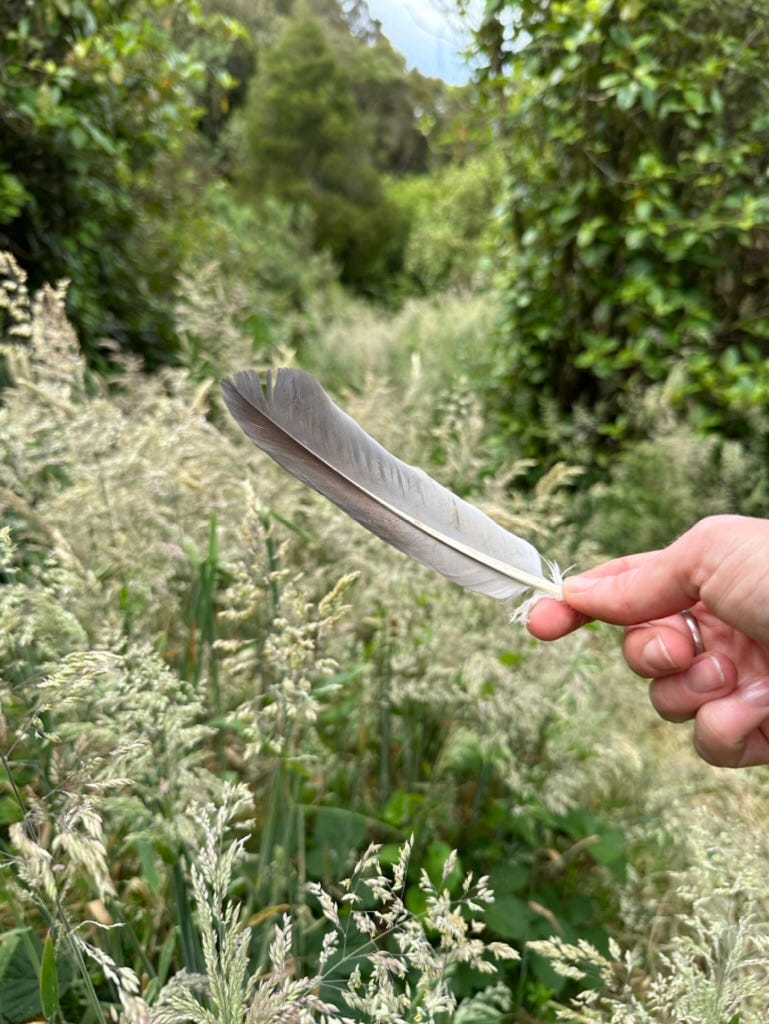

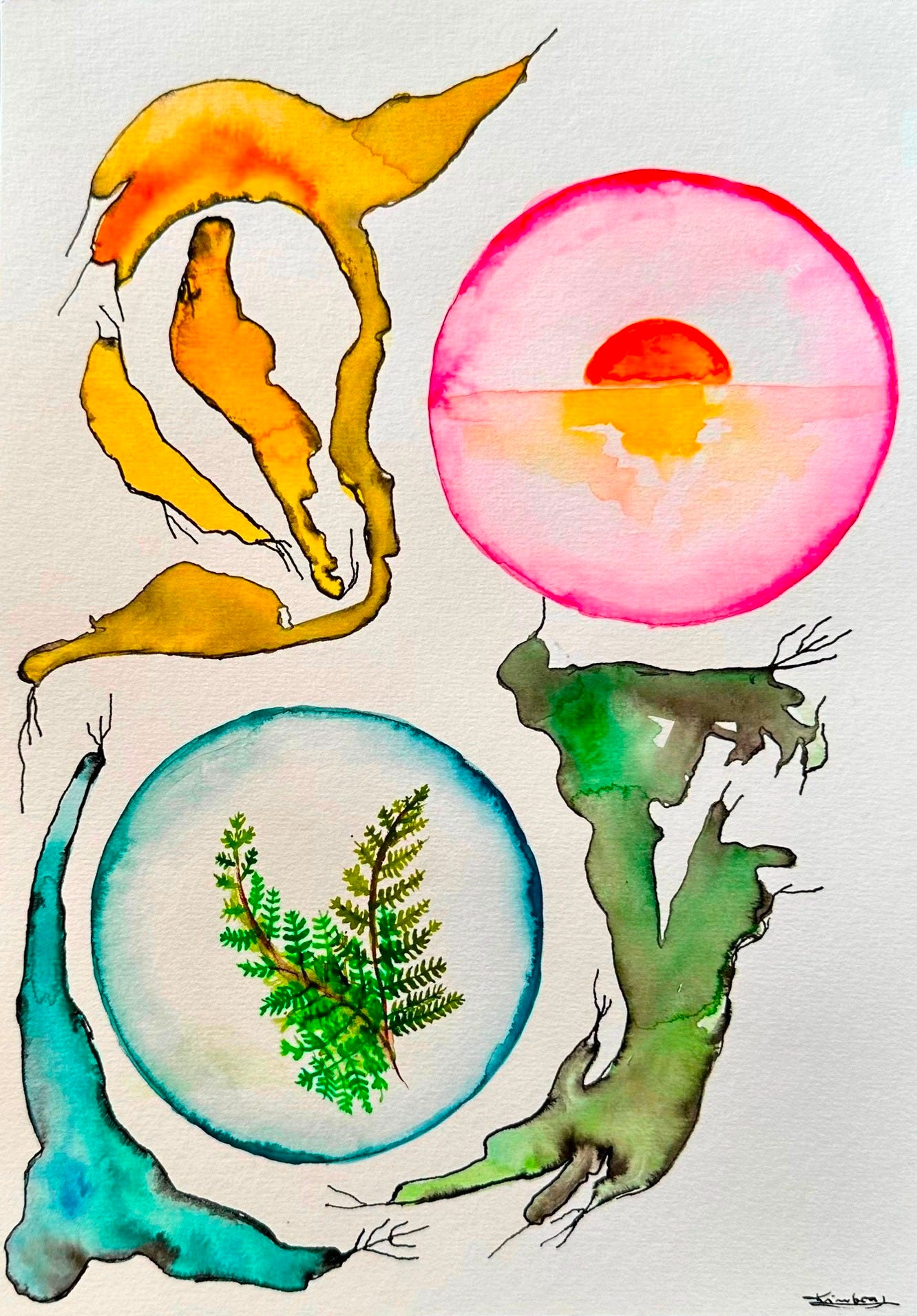

The question as to what foods to consume is a complicated one, and I think more complicated than many people, including many vegans, realize. Health plays a part, ethics plays a part, religion can play a part, societal norms plays a part, etc. Too many factors to touch on them all.... I grew up on a farm, living close to domesticated animals of many types and getting much of my sustenance from them, both from meat and from milk. But it kills me to see documentaries showing the inhumane treatment by big farms of domesticated animals on a mass scale. And I can understand why some people would object to eating meat from domesticated animals on the basis of conscience alone. I could almost be one of these people myself, except that I could also object to eating plants based on conscience alone, in which case I would starve. I can't survive without consuming something that once lived. It's just not possible. But that doesn't mean we should be okay with the living things destined for our consumption to be treated like nothing more than objects for their entire existence.
If one does choose to eat meat, buying meat products from companies that treat their animals well might help with conscientious objections. The Certified Humane project can help one with that.
When it comes to plants, reasons also abound for being careful with what one consumes, for health reasons and ethical reasons, at the very least. Take corn for an example. For health reasons, my wife and I won't buy any product containing high fructose corn syrup. Moreover, some corn sold in stores has been genetically modified, and some people don't want to consume it, as it's not really clear how such food might impact human health. We certainly don't buy any foods identified as genetically modified. The thing is, corn itself is a product of thousands of years of selective breeding, having originated from a grass called teosinte in South America. Teosinte plants only have about a dozen kernels per ear, of a nature that can be easily dispersed, so that the plant can propagate without human intervention. Teosinte plants can grow in the wild for years. Modern corn plants have a life span of 90-120 days and aren't equipped to distribute their kernels for propagation. Modern corn could not survive without human intervention, and humans made it this way. So, all modern corn has been genetically manipulated, even if not technically modified. Is this okay, ethically? It's apparently okay as a modern societal norm, but would it be okay on a personal level, if an individual knew all the facts? If people don't have all the knowledge, it's difficult to make what they might deem their best decisions.
Further on the subject of plant crops, even if one is okay with consuming genetically modified plant material, there's always the question of the ethics of companies involved in the harvesting and producing of our food, and whether we as consumers should let those ethics sway our buying and consumption habits. If you haven't watched the film Percy vs Goliath with Christopher Walken and Christina Ricci, I recommend giving it a watch. I don't want to pose a question here about it, as it would be a spoiler in the asking.
I applaud anyone who spends time with domesticated animals and finds a spiritual connection with them. Doing so myself as a youngster helped shape me into who I am today. I also spent time as a youngster communing with plant life, both domesticated and wild--having grown up on 200 acres, some farmed and some left untouched--and my time with the plant life helped shape me as much as the animal life. I do struggle today with my conscience when deciding what to eat. If one tries to consider all the variables, the struggle can become overwhelming. If we knew everything that went into producing what we're buying to consume, we might never want to buy groceries or eat out at a restaurant again. Even when buying local at a farmer's market, one can't be sure of their processes. But can we all grow our own food? That won't work. Like I said... it can become overwhelming... and that may be why many people choose not to do any research about the subject at all, remaining blissfully ignorant. Yeah. It's good to know that some people care.
How does this work?
You ALWAYS end up speaking out my thoughts...
Spent the last month doing yoga and communicating with the animals in Rishikesh India (wild monkeys, strolling cows young and old, stray dogs and the big big birds).
On my way to Thailand now, wondering what will come next - but l'll know when you know...